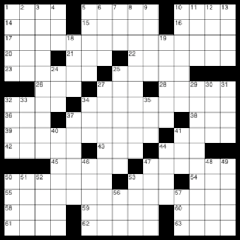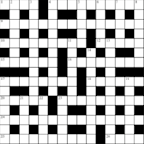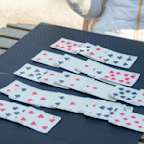Search results
Mar 17, 2024 · crossword puzzle, popular form of word puzzle. A crossword puzzle consists of a diagram, usually rectangular, divided into blank (white) and cancelled (black, shaded, or crosshatched) squares. This diagram is accompanied by two lists of numbered definitions or clues, one for the horizontal and the other for the vertical words, the numbers ...
- The Editors of Encyclopaedia Britannica
- Overview
- New Quizzes
- Games
- Featured Categories
- All Quiz Categories
See All Quiz Categories
Entertainment & Pop Culture
Geography & Travel
Health & Medicine
Lifestyles & Social Issues
Literature
Name That Dish! Quiz
Some mouthwatering food for thought.
Can You Remember These Mnemonics? Quiz
Fourteen (hopefully) unforgettable terms.
Name That Dessert! Quiz
Hope you’ve saved room for some sweet vocabulary.
Octordle
Can you solve eight words at once?
Play Now
Sudoku
Your daily logic challenge
Play Now
See All Quiz Categories
Entertainment & Pop Culture
Geography & Travel
Health & Medicine
Lifestyles & Social Issues
Literature
Entertainment & Pop Culture Geography & Travel Health & Medicine Lifestyles & Social Issues Literature Philosophy & Religion Politics, Law & Government Science Sports & Recreation Technology Visual Arts World History Image & Picture Quizzes Vocabulary Quizzes
People also ask
What is a crossword puzzle?
When did crossword puzzles start?
When did puzzles start?
What is a puzzle based on?
Box for a jigsaw puzzle of Norfolk county, England, by William Darton, Jr., 1804–12. Jigsaw puzzles became popular during the 18th and early 19th centuries in England as educational tools, particularly to teach geography. The puzzles originated as educational devices to teach geography (dissected maps) in 18th-century England.
- The Editors of Encyclopaedia Britannica
Albert Einstein was one of the greatest geniuses in the history of science. His theories, or ideas, led to new ways of thinking about the universe .
Revolution Begins. To help him solve France’s problems, Louis XVI called together the Estates-General in May 1789. The Estates-General was a group made up of representatives from the three classes, or estates, of French society: the church, the nobles, and the commoners. In June most of the commoners and some members of the other groups broke ...
An age-appropriate, safe encyclopedia resource designed for learning and homework assistance for kindergarten through fifth grade from Britannica Kids…
Frisian. Frank. Anglo-Saxon. Fleming and Walloon. Saxon. Germanic peoples, any of the Indo-European speakers of Germanic languages. The origins of the Germanic peoples are obscure. During the late Bronze Age, they are believed to have inhabited southern Sweden, the Danish peninsula, and northern Germany between the Ems River on the west, the ...









